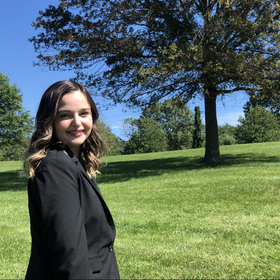By Kaitlin Dunn, Writer, Hospitality Sales & Marketing Association International (HSMAI)
As we think about future talent in our industry, there are a lot of concerning thoughts. How do we attract students? Has the pandemic discouraged students who were previously interested in hospitality?
 HSMAI’s student chapters at colleges and universities across the country have proven that there are still plenty of young people who are looking forward to being a part of the hospitality industry once they graduate — and bringing their own ideas and innovation to make it even better.
HSMAI’s student chapters at colleges and universities across the country have proven that there are still plenty of young people who are looking forward to being a part of the hospitality industry once they graduate — and bringing their own ideas and innovation to make it even better.
Brittany Ryan is president of HSMAI’s student chapter at James Madison University (JMU) in Harrisonburg, Virginia, where she is a marketing major with a concentration in professional selling and double minors in business analytics and global supply chain management and music. Founded in 2017, JMU is one of HSMAI’s newer student chapters but one of the most active.
Jennifer Hill, vice president of client solutions for Kalibri Labs, serves on the board of the HSMAI Washington, D.C., chapter and works directly with Ryan and other JMU students. She describes the chapter’s dedication to hospitality as “remarkable.” “Our student leaders are really phenomenal in their dedication to keeping the chapter active,” Hill said. “It’s really impressive how they’ve worked to find accommodations to allow for their meetings to continue, rather than just throwing their hands up.”
She added: “That’s a real opportunity for us moving forward as we’re thinking about talent in our industry to make sure we’re bringing in enthusiastic talent, which is going to be harder to do as we’re competing with other industries.”
Ryan has that enthusiasm. Recently she spoke with HSMAI to share her experience with leading the JMU chapter through the pandemic and her ideas to improve the industry. Full disclosure: She already has plenty!
How did you first get involved with HSMAI?
I initially joined the spring of my freshman year because my best friend was involved. After my first semester, I was on the executive board as the director of events, then in my third semester I became vice president, and this semester I’m president. My friend who was the reason I joined is still here, too, serving as vice president with me.
I grew up traveling the U.S. in a motor home with my family, so while I didn’t stay in a lot of hotels, I enjoyed staying at campgrounds, which are similar. I think that having that background showed me that hospitality is an avenue I can go down in my future.
What do your chapter meetings look like these days?
We meet twice a month, and because of COVID, we’ve been having speakers virtually, including a few that we’ve seen at D.C. chapter events. During our general meetings, we work on things like updating resumes and learning how to sell yourself. Usually, we have 10 to 15 people in person, but sometimes we have spikes in attendance if we have a really compelling speaker. One of the struggles we’ve had has been membership, but that’s also across the hospitality school in general.
This semester we focused on our marketing. We’re sending out emails, making social media posts, and advertising on the TV in hospitality school and in our classes to reach as many people as possible. Most of our members are in the hospitality school currently, but one of our focuses is reaching out to people in the business school (like me!) who want to go into sales or marketing.
A big part of the student chapter is interacting with its parent chapter — in JMU’s case, the D.C. chapter of HSMAI. What’s your relationship like with the chapter? Has it changed because of the pandemic?
Before COVID, our focus was traveling and visiting other companies through the D.C. chapter, such as Kalibri and Booking.com, to get the real-life experience. A lot of people join our chapter to see those parts of hospitality. We would also go up to D.C. to go to the chapter events, but now we tune into their virtual ones instead. It’s been great getting to see all of the speakers, and we’ve invited some of them back to speak to the rest of our chapter.
Besides leading your chapter of HSMAI, how are you getting hands-on experience in the hospitality industry now?
I work at the Hotel Madison in Harrisonburg in the restaurant and housekeeping. It’s great, because I get to talk to everybody and see what different jobs get to do. Many people say that you have to learn every function of the business to run it. It’s a good experience working in housekeeping, because it’s one of the most important parts of the business, since it is actually creating the product that’s being sold.
This semester, I’m also interning with HSMAI’s D.C. chapter. Currently, I am helping them with prospecting and finding points of contact for future partnerships. It’s tedious but putting the skills I’ve learned in class to real life use, and that’s fun for me.
How has the pandemic changed your perspective on the industry?
I think my perspective changed because I saw there is a lot more that hotels could do to improve their outreach and markets. For example, most of the hotels in Harrisonburg depend on school activities and events as a source of revenue, but once school shut down last year, that got tossed away.
However, there are so many new markets that could have been touched into. Some hotels were able to, but others didn’t feel like there was anything they could do or anyone they could target. I think this made me see that there is always something you can do and there are always people you can sell to, but it’s about getting over the barriers.
I think a lot of our members are discouraged and hear from speakers and professors about being hard hit, but as a club we are trying to change that outlook. I know that once the pandemic is over, people are going to travel again.
What is your plan for the future?
Honestly, I’m not sure what I want to do quite yet. Ideally, I would want to go more into the data or analytical field, but not sure what umbrella. That’s one of the things I love about HSMAI — I get to see different parts of the hospitality industry and see viewpoints that I otherwise never would.
